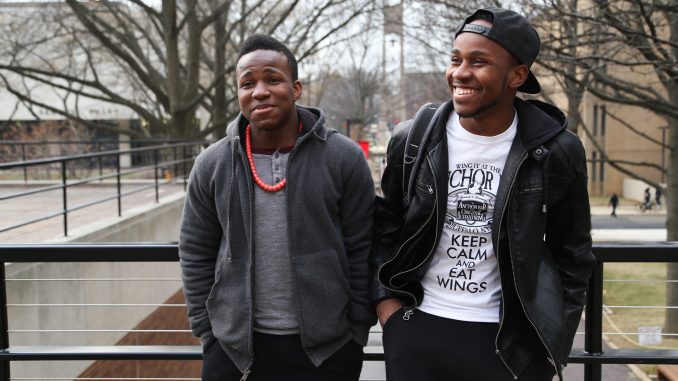
Oreoluwa and Iyanuoluwa Alonge noticed a change when they visited their home in Nigeria over Winter Break – a security guard accompaniment.
“Anywhere we go – we’re going to the mall, we’re going to watch a movie, we’re going out with friends – there’s a security guard with us all the time,” Oreoluwa, a junior majoring in biomedical engineering, said.
“It wasn’t fun,” Iyanuoluwa said. “You had to stay home most of the time.”
Nigeria, which is the most populous country in Africa with more than 174 million people, has been devastated by brutal attacks from the radical Islamic group Boko Haram. The terrorist organization was responsible for more than 10,340 deaths from November 2013 to November 2014 and has caused over a million Nigerians to flee the country, according to the Council on Foreign Relations.
Oreoluwa and Iyanuoluwa belong to a student organization at Temple called the Society of Emerging African Leaders (SEAL), which empowers African immigrants to aspire to business leadership. Senior public health major Sandra Buruzie, the president of SEAL, helps plan events that cater to African students.
“Our mission and our goal is to create a venue for Africans and people who are interested in helping Africans,” she said.
SEAL brings attention to issues in Africa and organizes conferences and galas that invite Africans who are succeeding in their field of work.
Buruzie, who left Nigeria at the age of nine, said that no one in her family really brings up Boko Haram and the terror it has caused in her home country.
“No one, not from my family … even my parents don’t really talk about it,” she said. “If they do, it’s probably something we just recently heard on CNN or something like that.”
Buruzie said her family is from southern Nigeria, so they are not as affected by the terrorist activities that have been perpetrated mainly in the North.
Despite the destruction and the mass killings by Boko Haram, the international media and the American public have been often silent about the tragedy in Nigeria since 276 girls were abducted from a school in the northeastern region of the country in April, sparking the social media hashtag “#BringBackOurGirls.”
“It is not as accessible to the media,” African American Studies Department chair Dr. Molefi Asante said. “You don’t have anybody who’s embedded with the Nigerian army.”
He visited Nigeria a year ago and spoke to government officials in the capital city of Abuja. The national government, led by President Goodluck Jonathan, has been criticized for its response to the violence.
“The government is paying attention to it [Boko Haram], but the government is not acting on it,” Asante said.
The death toll of a recent Boko Haram attack on the town of Baga was initially set at 2,000 by multiple news outlets; however, the Nigerian military claims that 150 people died in the attack.
“Somebody’s lying,” Asante said. “I don’t think the Nigerian government can be trusted on that.”
Though the Alonge brothers do not live in the North, where most of the terrorist attacks have occurred, they do feel at risk because their father, Tempitope Alonge, is the chief medical director of the University College Hospital in the city of Ibadan, a major hospital in the region.
“He’s in a position of power,” Oreoluwa said. “And people in a position of power are targeted more.”
The Alonge brothers said they noticed tension between Christians and Muslims during their stay in Nigeria. Despite this, they said they see a growing unity in the face of terrifying violence.
“It’s also brought Christians and Muslims closer,” Oreoluwa said. “Even though we have our two religions, we’re still Nigerians.”
Jack Tomczuk can be reached at jack.tomczuk@temple.edu or on Twitter @JackTomczuk


Be the first to comment